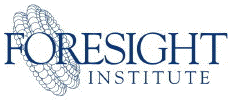Winners of the 2011 Feynman Prizes in nanotechnology
October 18, 2012
 The Foresight Institute has announced the winners of the 2011 Foresight Institute Feynman Prizes for Nanotechnology Theory and Experiment.
The Foresight Institute has announced the winners of the 2011 Foresight Institute Feynman Prizes for Nanotechnology Theory and Experiment.
The winner of the 2011 Feynman Prize for Experimental work is Leonhard Grill (Fritz Haber Institute, Max Planck Research School, Germany) in recognition of his pioneering and continuing work on manipulating and structuring functional matter at the atomic scale.
He has used scanning tunneling microscopy to characterize the electronic and mechanical properties of single molecules; constructed atomically precise covalent molecular nanostructures from single molecules; and used an STM tip to roll a 0.8 nanometer molecular wheel on a surface.
The winner of the 2011 Feynman Prize for Theory is Raymond Astumian (University of Maine, USA) for his contributions to the understanding of Brownian motion and its use to power molecular motors and other functional mechanisms at the atomic scale.
In awarding the prizes, Ralph C. Merkle, Chairman of the Prize Committee, noted that “The work of these Feynman Prize winners has brought us one step closer to answering Feynman’s 1959 question, ‘What would happen if we could arrange atoms one by one the way we want them?’ “And the ability to simulate and manipulate atoms advanced by the work of these Prize winners will enable us to design and build engineered molecular machinery with atomic precision.
“It will take us another step on the way to the development of revolutionary nanotechnologies that will transform our lives for the better.”
The annual Feynman Prizes represent milestones on the road to the award of the $250,000 Feynman Grand Prize, an incentive prize that will be awarded to the first researchers to make a nanometer-scale robotic arm and a nanometer-scale computing device, two critical components of an atomic scale molecular manufacturing system.
The annual Foresight Feynman Prizes were established by the Foresight Institute in 1993 and named in honor of Nobel Prize winner Richard Feynman whose influential essay, “Plenty of Room at the Bottom” inspired the first work on nanoscale science.
Dr. Merkle has provided key references (see below) for these awards to KurzweilAI.